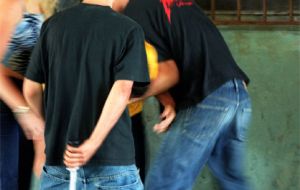MercoPress. South Atlantic News Agency
Latin America the most insecure region in the world suffers 'epidemic of violence'
 One in three Latin Americans reported being a victim of a violent crime in 2012, says the UN report
One in three Latin Americans reported being a victim of a violent crime in 2012, says the UN report Despite a decade of economic growth, Latin America is the most insecure region in the world, and an increase in crime on the continent has led to “an epidemic of violence” that is affecting growth, according to a report released by the UN Development Program. One in three Latin Americans reported being a victim of a violent crime in 2012, with the majority of the attacks being mainly robberies.
“Latin America today shows stronger and more integrated economies, less poverty, more consolidated democracies, as well as states that have taken on greater responsibilities in terms of social protection,” the UN said in its report Citizen Security with a Human Face: evidence and proposals for Latin America.
“However, the weak link in the region is crime and insecurity. Throughout the last decade the region has suffered an epidemic of violence, accompanied by the growth and dissemination of crime, as well as an increase in fear among citizens,” it continued.
The report also says that insecurity, in terms of personal safety, has also led to lifestyle changes for Latin American families: between 45% and 65% of those questioned told UN researchers that they’ve stopped going out at night due to fear. Thirteen percent reported having felt the need to change their home or residence for fear of being a victim of a crime, according to a survey by the UN team.
“This is a change in the lives of the people, a change in the behavior of people,” said Heraldo Muñoz, the UN Under-Secretary General and Director for Latin America and the Caribbean.
“As this has an impact on the lives of families, (the) wealthy middle classes hire private guards. Today in the region, (we) have almost 50% more private police guards. What this does is exacerbate existing inequalities.”
“There is no magic solution to insecurity, but this serious problem can be remediated—with vision and long-term political will,” he added.
The report argues that insecurity affects every country in the region. But it suggests that government and community action to control crime levels and lower incidents is not enough — countries need to improve the lives of its citizens, boost inclusive economic growth and improve their judicial institutions.
“Citizen security is a sensitive issue which preoccupies many political decision-makers and reverberates in the heat of electoral campaigns,” said UN Development Program Administrator Helen Clark.
“It is a crucial issue for several regions, including Latin America and the Caribbean, because without peace there can be no development, and without development there can be no lasting peace.”
Latin America has experienced both economic growth and increased crime rates over the past decade, with more than 100,000 murders per year during that time. The UN stated that in 11 of the 18 assessed countries the rate is higher than 10 murders per 100,000 inhabitants.
The UNDP conducted surveys in prisons in Argentina, Brazil, Chile, El Salvador, Mexico and Peru to compare criminals and their experiences of crime. In Argentina 59.9% of prison inmates questioned said they had carried a weapon to commit a crime, the highest of the six countries. 37% of those inmates had used a weapon, but most shockingly, 65.4% had a weapon before the age of 18.
However, the robbery rate in Argentina, according to the UN, had fallen when they compared statistics from 2005 (980 per 100,000 inhabitants) and 2011 (973 per 100,000 inhabitants).
The upbringing of criminals was something that the UN also looked at. One in three prisoners said they had left home before the age of 15 (in Chile, one in every two), and between 13% (Argentina) and 27% (El Salvador) never met their father or mother. In all six countries, more than 80% of inmates did not complete 12 years of schooling.
One of the report’s lead authors, Rafael Fernandez de Castro, suggested that one learning from the study was that “iron fist” policies do not work: he said strong police and criminal repression often coincided with high crime rates.




Top Comments
Disclaimer & comment rules-

-

-

Read all commentsTut tut tut.
Nov 13th, 2013 - 09:25 pm 0That is just rubbish UN, those statistics are frauded by the government and people don’t even bother to call the police to press charges nor denounce crime…
Nov 13th, 2013 - 11:49 pm 0The rise of the cartels is unstoppable. Just this week federal judges of Jujuy and Salta next to Bolivia have being calling desperately for help to the Supreme court and the Executive in Buenos Aires as they are being overrun by criminals and narcotrafficking related cases. More people are murdered in Rosario than in Medellín, Colombia
http://www.cij.gov.ar/adj/pdfs/ADJ-0.387652001384282029.pdf
Don't most of the criminals in Argentina come from Paraguay? I think I've read somewhere that is like 80% of the crime is commited by Paraguayans. Still, I think the article should have showed more stats about my country, Brazil, and Mexico, Venezuela and Colombia instead of Argentina and Chile which are actually among the safest.
Nov 14th, 2013 - 04:10 am 0Brazil needs to protect its borders, apply life imprisonment and death penalty and privatize the jails.
Commenting for this story is now closed.
If you have a Facebook account, become a fan and comment on our Facebook Page!